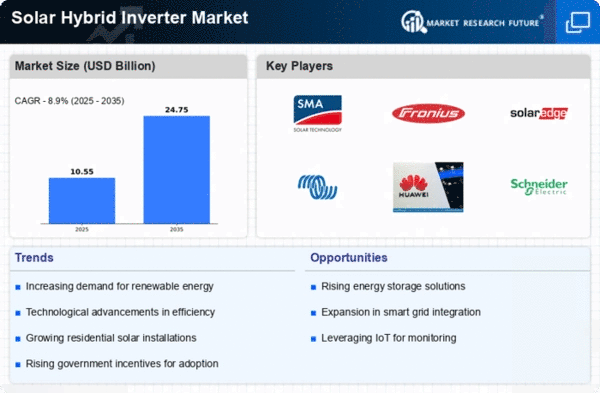Top Industry Leaders in the Solar Hybrid Inverter Market

*Disclaimer: List of key companies in no particular order
The global solar hybrid inverter market is experiencing substantial growth, propelled by escalating energy costs, augmented government backing for renewable energy, and ongoing technological advancements. This landscape is marked by fierce competition, where entrenched players vie for market dominance against the backdrop of emerging contenders. The resultant competitive milieu acts as a catalyst for innovation, ensuring consumers have access to a diverse array of high-quality products at competitive prices.
Key Players and Strategies:
Several influential players dominate the solar hybrid inverter market, featuring companies such as-
Flin Energy (India)
Havells (India)
Schneider Electric (France)
Microtek Inverters (India)
Delta Energy Systems (Germany)
Pure Volt (India)
Su-Kam power systems (India)
Redback Technologies (Australia)
Luminous (India)
EAST Group (China)
KACO new energy (Germany)
Tabuchi Electric (US)
SolarEdge Technologies (Israel)
Voltronic Power Technology (Taiwan)
SolaX Power (China), and others.
Each of these players employs distinctive strategies to fortify their market presence:
-
SMA Solar Technology AG: A prominent German manufacturer globally recognized for its emphasis on high-efficiency and reliable inverters.
-
SolarEdge Technologies: An Israeli company renowned for its unique power optimizer technology, providing advanced monitoring and control capabilities.
-
ABB Ltd.: A Swiss multinational corporation offering a comprehensive range of solar hybrid inverters for various applications.
-
Huawei Technologies Co., Ltd.: A Chinese technology giant rapidly gaining market share with its cost-effective and innovative inverter solutions.
-
Fronius International GmbH: An Austrian company focusing on high-performance inverters for residential and commercial applications.
-
Sungrow Power Supply Co., Ltd.: A Chinese manufacturer offering a wide range of solar inverters, including hybrid models, at competitive prices.
-
GoodWe Power Electronics Co., Ltd.: Another Chinese manufacturer known for its cost-effective and reliable solar inverters.
-
Delta Electronics, Inc.: A Taiwanese company with a strong presence in the power electronics industry, offering a growing range of solar hybrid inverters.
-
Power Electronics Pty Ltd.: An Australian manufacturer specializing in high-quality solar inverters for residential and commercial applications.
-
Schneider Electric SE: A French multinational corporation with a diversified portfolio, offering a growing range of solar hybrid inverters.
These key players leverage various strategies, such as product differentiation, cost leadership, distribution network expansion, brand building, and strategic partnerships, to gain market share.
Factors for Market Share Analysis:
Market share analysis in the solar hybrid inverter market considers several factors:
-
Product Portfolio: Assessing the breadth and depth of the product portfolio catering to diverse customer needs and application requirements.
-
Market Presence: Evaluating the geographical reach of the company and its ability to penetrate new markets.
-
Technology Leadership: Gauging the level of innovation and expertise in inverter technology, offering advanced features and performance.
-
Brand Reputation: Considering the company's reputation for quality, reliability, and customer service.
-
Financial Strength: Analyzing the company's financial resources and ability to invest in research and development, production capacity, and marketing efforts.
New and Emerging Trends:
Several emerging trends are shaping the competitive landscape of the solar hybrid inverter market:
-
Integration with Energy Storage Systems: Growing integration with energy storage systems allows for self-consumption optimization and increased energy independence.
-
Artificial Intelligence and Machine Learning: The adoption of AI and ML in inverter technology optimizes performance, predicts failures, and improves overall system efficiency.
-
Digitalization and Connectivity: Increasing focus on digitalization and connectivity enables remote monitoring, diagnostics, and control of solar hybrid inverters, enhancing system management and troubleshooting.
-
Decentralization and Microgrids: The trend of decentralized energy generation and the development of microgrids are driving demand for smaller, more modular solar hybrid inverters.
-
Emerging Markets: The rapid growth of the solar energy market in emerging economies creates significant opportunities for solar hybrid inverter manufacturers.
The competitive landscape in the solar hybrid inverter market is expected to remain intense. Established players will continue to invest in innovation and expansion, while emerging entrants will challenge the market with cost-effective and disruptive technologies. Success in this dynamic environment requires a focus on product differentiation, strategic partnerships, and expansion into new markets. Additionally, the adoption of new trends like energy storage integration, AI, and digitalization will reshape the competitive landscape and create new opportunities for innovative players.
Industry Developments and Latest Updates:
-
Flin Energy: Launched 'FLIN Hybrid X3' in May 2023, a hybrid inverter with AI-powered energy management.
-
Havells: Entered a strategic partnership with Sungrow Power Supply in June 2023 to expand its hybrid inverter offerings.
-
Microtek Inverters: Released a new range of hybrid inverters with MPPT technology in July 2023.
-
Luminous: Introduced the 'Luminous Crux' hybrid inverter in October 2023, targeting the residential market.










